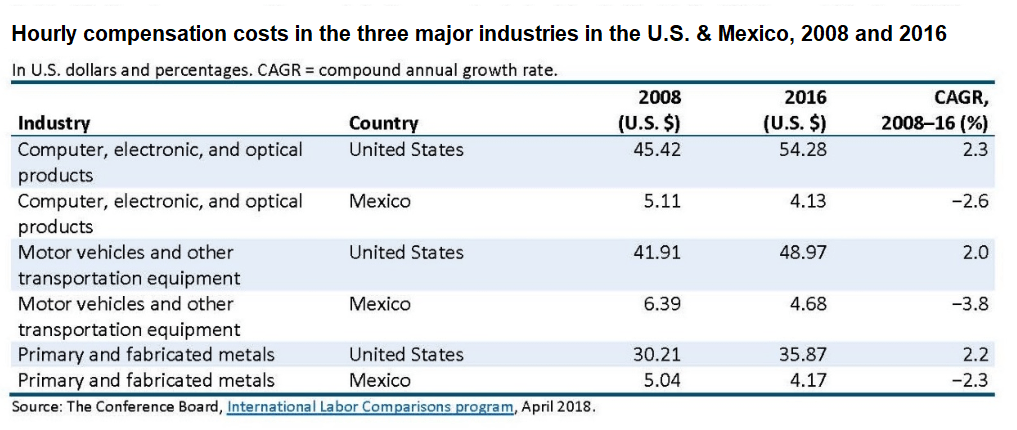It’s been one year since NAFTA got a makeover, and despite new labor and environmental rules to make the U.S. Mexico Canada Agreement better than the original one, our two biggest regional trade partners have imposed non-tariff barriers on American goods and services.
“Mexico promised to improve labor laws. It’s moving slowly,” said Senate Finance Committee Chairman Ron Wyden (D-OR). “The Biden administration has had to act using the Rapid Response Mechanism tool…to protect American workers,” he said about a new rule that allows for faster dispute mechanisms over labor disparities pitting American workers (usually in the auto sector) with their much lower paid Mexican counterparts.
Wyden said that Canada and Mexico have since issued new laws and regulations that are not in line with the USMCA agreement. Both have threatened to ban certain (GMO) agricultural products. Canada is imposing digital services taxes, irking Wyden as this impacts tech companies in Oregon. “This is a big setback for our trade relationship with Canada,” he said, adding that the U.S. will “consider all options in our response.”
If this doesn’t make one wonder why large sweeping trade deals are not the golden ticket to prosperity for all, and the epitome of free and fair trade, then what will. A recent International Trade Commission report also touted the lackluster benefits of free trade agreements, citing NAFTA as one massive agreement still riddled with holes.

Wyden was leading a hearing on Tuesday titled “Implementation and Enforcement of the United States – Mexico – Canada Agreement: One Year After Entry into Force.”
“It is so important that we find common ground on this issue,” Wyden said about leveling the playing field for American labor and small to mid-sized businesses. “It is so important for American workers,” he said.
One of the witnesses at today’s hearing, Benjamin Davis, director of international relations for the United Steelworkers Union, said the USW originally supported USMCA. He’s now having second thoughts. Mexican labor unions are nowhere near on the same level as American labor unions. Price disparity for workers, especially in the electronics and automotive industry, is an impossible bridge to gap.
“NAFTA, and the generation of trade agreements that followed, did tremendous damage to the American middle class and, in many ways, sowed the seeds of our current political crisis,” he said in his opening remarks.
“The argument that trade improves the general welfare, without taking account of its differential impact across all sectors of the population – particularly, manufacturing workers – has been questioned in theory and clearly refuted in reality. In order to effectively assess the value of a good or a service, we must analyze not only its price, but the conditions under which it was produced.” — Benjamin Davis, United Steelworkers Union
Davis has insider knowledge on this issue, too. He is the chair of the Independent Mexico Labor Expert Board, an entity created by the USMCA implementing bill passed by the Senate Finance Committee and signed into law.
One issue that was brought up in regard to the Rapid Response Mechanism was the GM assembly line in Silao, Mexico. This labor union battle has been discussed on at least two occasions with Katherine Tai, the U.S. Trade Representative, in both House and Senate hearings. GM’s Silao factory, which makes the GMC Sierra and Chevy Silverado pick-up trucks that come into this country duty-free, is the subject of a USTR-initiated investigation under that Rapid Response Mechanism. The starting wage there is a whopping $1.35 per hour. On the high end, for mechanical engineers, the wage is under $8.
Teenagers flipping burgers in McDonald’s earn more.
Collective bargaining agreements do not exist in Mexico and have been denied there for many years. “The jury is still out as to whether Mexico’s new laws and the USCMA will make a difference,” Davis told the Senate Finance Committee.
With just one year in, the USTR is also going after Canada for their recent dairy quota system. Canada argues that the U.S. notoriously over-produces milk and other dairy products and would flood their domestic market, overtaking their local producers. Canada, of course, has a right to protect its market. We should learn to do the same.
Mexico has acceded to European Union demands to prevent the use of common food names through the imposition of illegitimate geographical indicators (GI). This is part of the EU-Mexico trade deal. So American dairy farmers can’t sell parmesan cheese because parmesan cheese is only Italian.
“The use of GIs…must be firmly rejected as the protectionist and anti-trade policy that they are,” said Allan Huttema, chairman of the Northwest Dairy Association/Darigold.
While the U.S. cannot distinguish between American raised beef and Mexican raised beef based on country of origin labeling rules put forth by the World Trade Organization, the Italians can somehow only be allowed to sell parmesan cheese to the Mexicans and the American dairy farmer has to come up with a qualifier, like American parmesan or some such thing.
The lopsided trade rules that disfavor American manufacturing, and American farmers, are legion.
“We need enforcement, not just rhetoric,” said Sen. John Cornyn (R-TX), who continued to hop on his favorite trade agreement, the Trans-Pacific Partnership. While today’s hearing was not about China, Cornyn said we needed TPP to counter China. He says this during every Senate Finance hearing on trade.
Still, one of the China concerns in regard to the USMCA was its use of Mexico as a dumping ground to ship goods to the U.S. duty-free.
“China is sending steel through Mexico to be dumped in U.S.,” warned Sen. Bill Cassidy (R-LA).
The Ole Bigger Trade Deal ‘Remedy’
Despite hearing from witnesses on how these trade deals were, at best, a double-edged sword, Cornyn’s corporate ally in the Senate, Sen. Pat Toomey (R-PA), called on the Biden administration to “pursue trade liberalization policies.”
CPA believes this is still an unpopular opinion in Washington.
In the Tuesday edition of The New York Times, former USTR Robert Lighthizer wrote an op-ed about the Trade Act of 2021 provision that was placed into the recently passed U.S. Innovation and Competition Act as a gift to China. That provision was largely the handiwork of Senate Finance Committee’s ranking member Sen. Mike Crapo (R-ID).
The provision would weaken China trade war tariffs – the Section 301s — and make it easier for companies, who were given two years to remap their supply chains out of mainland China, to recoup some of their duties paid to Treasury, and keep importing from China, without the tariff.
Wyden largely went along with the provision in order to get more support for the bill from old school free-trader Senate Republicans. The bill passed, though mostly along party lines with Sens. Crapo and Cornyn voting in favor, thanks in large part to that trade provision. Sen. Toomey voted against it.
Lighthizer said Americans were competing with China with one hand tied behind its back. In some cases, that could be looked at as symbolic of a fight that is so easily won, two hands are not needed – like Darth Vader fighting Luke Skywalker. But that’s not where the retired trade diplomat was going.
“The Senate appears to have caved to pressure from corporate lobbyists and included, in an otherwise laudable bill, a China-friendly amendment titled the Trade Act of 2021,” he wrote. “It’s now up to the House of Representatives and President Biden to save us from this folly. After the bill’s passage in the Senate, President Biden praised it. But unless the House succeeds in reshaping it, he should veto this legislation and send it back to Congress for another try.”
— CPA intern William Burns helped with this report.













